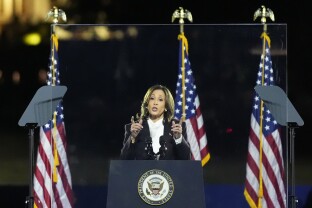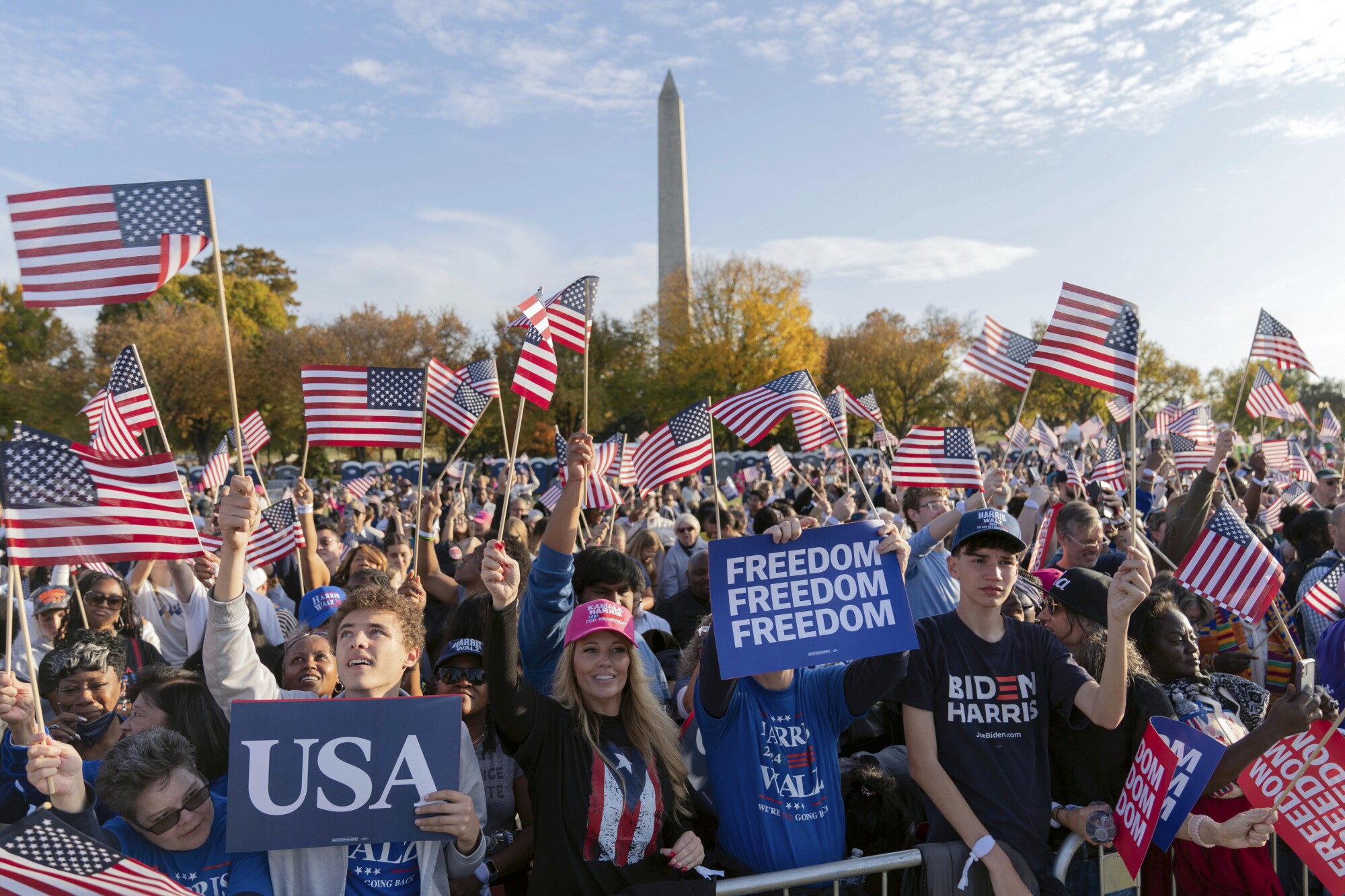WASHINGTON, D.C. — Under the soft light of the White House, Kamala Harris made the most expansive case yet for why Americans should support her candidacy over Donald Trump’s, asking voters to reject his “chaos” and choose a different path forward.
“It is a choice about whether we have a country rooted in freedom for every American or one ruled by chaos and division,” Harris said, surrounded by what her campaign said was 75,000 attendees spilling out onto the National Mall, with hundreds holding up American flags and USA signs.
The highly publicized speech was meant to be the closing argument for the three-month-long campaign that shook up the presidential race entirely, breathing new life into Democrats’ chance to keep the White House. Harris sought to cast her candidacy as part of a new generation, rooted in the common good, that’s fighting to dispel the old guard of leadership now represented by the former president, whom she likened to a “petty tyrant.”
“Donald Trump has spent a decade trying to keep the American people divided and afraid of each other. That’s who he is. But America, I am here tonight to say: That’s not who we are,” she said.
Harris spoke sandwiched between the monuments and the White House, as the campaign hoped to project the gravity of the moment by signifying the past. Almost four years ago, Trump delivered a speech in the exact same location that encouraged a mob of insurrectionists to storm Capitol Hill, where Congress had gathered to certify the 2020 presidential election results.
Harris rebuked the 2021 insurrection in her speech and characterized Trump as “unstable, obsessed with revenge and filled with grievance.”
“He’s the very person who stood in this very spot and sent an armed mob to the Capitol,” she said.
Harris’ campaign told reporters before the speech that they believed the location would help “crystalize the choice in this election.”
For weeks, the campaign has worked to get Americans to remember the worst of the Trump administration and feared that too many saw his four years in office with rose-colored glasses after years of inflation.
Aides, who say Harris purposefully chose to tout “freedom” over the “democracy” message at the beginning of her truncated campaign, saw Tuesday night’s message not as a return to the original Biden-era theme but a personalization of how Trump’s second term would impact the average American.
Harris’ remarks are not meant to serve as a “lecture” or “history lesson,” one campaign operative said, akin to speeches Joe Biden has given in the past on democracy. The speech, instead, was meant to carry a practical implication — with economic and security policy details — and was intended to resonate with the public.
With a crowd stretching as far back as the Lincoln Memorial, Harris also took the chance to explain who she is — an unusual step for the last days of a campaign, but one meant to address a central question plaguing her campaign.
“I recognize that this has not been a typical campaign. Even though I have had the honor of serving as your vice president,” she said. “Many of you are still getting to know who I am.”
Harris went through her biography, casting herself as a D.C. outsider used to taking on tough fights. She continued to compare her upbringing with Trump’s, framing him as only caring about the billionaire class while she was the product of the middle class. She outlined her vision for the country, ticking through her economic policies (she said she’d prioritize bringing down costs), border policies (she again said she’d sign the bipartisan bill that died in Congress earlier this year) and her abortion stance.
Harris attacked Trump by repeating a line familiar with her campaign’s early days: that Trump has in mind “more chaos, more division and policies that help those at the very top and hurt everyone else.”
“I will always tell you the truth, even if it is difficult to hear,” she said, sounding like Biden, while tacking toward the middle. “I will work every day to build consensus, compromise and get things done. If you give me the chance to fight on your behalf, there’s nothing in the world that would stand in my way.”
Another Democratic strategist told NOTUS a goal of the speech was helping America see Harris, a Black and South Asian woman, as president. She stood behind the vice presidential seal, in between two American flags and with the White House behind her.
It’s not that Harris’ campaign thinks her speech will result in a massive spike in support — after all, she’s effectively tied with Trump in the polls. But with the reality of the election being won by razor-thin margins crystallizing each day as Nov. 5 approaches, Harris’ closing argument, campaign officials said, was a direct appeal to undecided voters.
Voters who, as campaign chair Jen O’Malley Dillon put it, are “exhausted” and “certainly frustrated by the state of the partisanship and divided political system that was really defined under Donald Trump.”
“This speech is really designed to reach those undecided voters,” O’Malley Dillon told reporters on a press call early Tuesday. “Those folks that are making the decision to break through in a moment where sometimes it’s hard to break through, and to really talk about what’s at stake in this election.”
Internal polling, according to a source close to the campaign, has also shown that Harris directly attacking Trump as a “threat to democracy” would push voters toward her “in the ninth hour.”
So, the campaign sought to replicate a strategy that fended off the supposed “red wave” during the 2022 midterms. In the weeks preceding that year’s elections, Biden made a similar argument about how Trump’s rhetoric incites violence.
“It is the argument that resonates the most with them,” the source said. “Because if I don’t agree with Kamala Harris on her policies, what would make me give her a second look? What would make me give her my vote?”
“What most resonates with them is the idea that, ‘While I may agree with Trump on some policy, he is fundamentally a danger,’” the source added.
To that audience, Harris pledged Tuesday night to “seek common ground and commonsense solutions.”
“I am not looking to score political points. I am looking to make progress,” she said. “I pledge to listen to experts. To those who will be impacted by the decisions I make. And to people who disagree with me. Unlike Donald Trump, I don’t believe people who disagree with me are the enemy. He wants to put them in jail. I’ll give them a seat at the table.”
While Harris did outline the broad strokes of what she would do in office and how she is different from Trump, what was less clear was a cohesive message of why she was running for president. Still, the throughline in her remarks was an optimistic one, gently warning Americans that they didn’t have to choose the status quo.
“I promise to always put country above party and self,” she said. “I love our country with all my heart. And I believe its promise because I lived it.”
—
Tinashe Chingarande is a NOTUS reporter and an Allbritton Journalism Institute fellow. Jasmine Wright is a reporter at NOTUS.
Sign in
Log into your free account with your email. Don’t have one?
Check your email for a one-time code.
We sent a 4-digit code to . Enter the pin to confirm your account.
New code will be available in 1:00
Let’s try this again.
We encountered an error with the passcode sent to . Please reenter your email.



